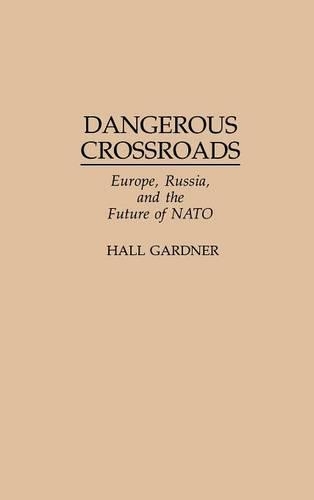
Dangerous Crossroads: Europe, Russia, and the Future of NATO
(Hardback)
Available Formats
Publishing Details
Dangerous Crossroads: Europe, Russia, and the Future of NATO
By (Author) Hall Gardner
Bloomsbury Publishing PLC
Praeger Publishers Inc
30th August 1997
United States
Classifications
Tertiary Education
Non Fiction
Warfare and defence
International relations
Police and security services
355.031091821
Physical Properties
Hardback
296
Description
Gardner explores the global ramifications of the NATO-Russian relationship. He examines NATO's Partnership for Peace initiative as it relates to Russia, and he argues that NATO risks provoking Russia and other states that do not expect to become "full" members of the alliance. He contends that if NATO and Russia cannot reach a compromise over a new system of security in Central and Eastern Europe, then Russia could adopt an increasingly assertive "Eurasian" stance by more closely aligning with potentially anti-Western states such as Belarus, China, India, Iraq and Iran. Likewise, the possibility of a renewed division of Europe cannot be ruled out. Gardner asserts that it is absolutely necessary to draw Russia into a concerted relationship with the United States and the European Union. He concludes by formulating a viable system of cooperative-collective security for all Central and Eastern European states backed by conjoint NATO, European and Russian security guarantees. It is an analysis which should be of interest to policymakers and students of international relations and contemporary defence issues.
Reviews
[Hall's] book is comprehensive, richly documented, and equal to the task undertaken....His book is especially useful for foreign affairs and defense policymakers, academics, and advanced graduate students interested in U.S. foreign policy, national security policy, or international relations.-The Russian Review
Gardner's treatment reflects a balance and objectivity that can be appreciated when so much of the discourse concerning United States security policy toward Russia continues to reflect the misconceptions and predjudices of the Cold War.....Gardner offers a thoughtful alternative to existing strategies for forging a post-Cold war security structure.....Hall Gardner's Dangerous Crossroads constitutes a significant contribution devoted to resolving an issue that will shape the security structure of the entire global community into the twenty-first century.-Slavic Review
This book is timely material for a debate that will extend through spring 1998 as the governments of NATO countries decide whether to incorporate Poland, the Czech Repulic, and Hungary into the Atlantic Alliance.-Choice
"Hall's book is comprehensive, richly documented, and equal to the task undertaken....His book is especially useful for foreign affairs and defense policymakers, academics, and advanced graduate students interested in U.S. foreign policy, national security policy, or international relations."-The Russian Review
"[Hall's] book is comprehensive, richly documented, and equal to the task undertaken....His book is especially useful for foreign affairs and defense policymakers, academics, and advanced graduate students interested in U.S. foreign policy, national security policy, or international relations."-The Russian Review
"This book is timely material for a debate that will extend through spring 1998 as the governments of NATO countries decide whether to incorporate Poland, the Czech Repulic, and Hungary into the Atlantic Alliance."-Choice
"Gardner's treatment reflects a balance and objectivity that can be appreciated when so much of the discourse concerning United States security policy toward Russia continues to reflect the misconceptions and predjudices of the Cold War.....Gardner offers a thoughtful alternative to existing strategies for forging a post-Cold war security structure.....Hall Gardner's Dangerous Crossroads constitutes a significant contribution devoted to resolving an issue that will shape the security structure of the entire global community into the twenty-first century."-Slavic Review
Author Bio
HALL GARDNER is Professor and Chair of the Department of International Affairs and Politics at The American University of Paris. He is the author of Surviving the Millennium: American Global Strategy, the Collapse of the Soviet Empire, and the Question of Peace (Praeger, 1994).
